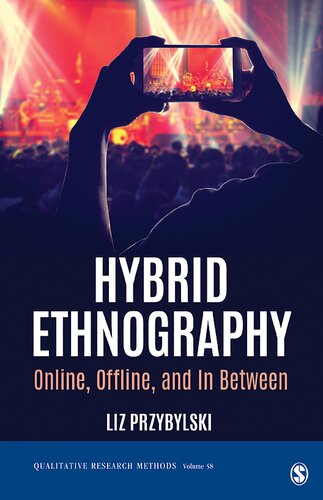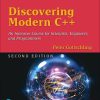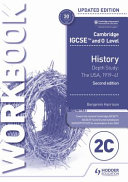Hybrid Ethnography Online Offline and In Between 1st Edition by Liz Przybylski 1544320329 9781544320328
$50.00 Original price was: $50.00.$25.00Current price is: $25.00.
Hybrid Ethnography Online Offline and In Between 1st Edition by Liz Przybylski – Ebook PDF Instant Download/Delivery: 1544320329, 9781544320328
Full download Hybrid Ethnography Online Offline and In Between 1st Edition after payment

Product details:
ISBN 10: 1544320329
ISBN 13: 9781544320328
Author: Liz Przybylski
Today′s research landscape requires an updated set of analytical skills to tell the story of how people interact with and make meaning from contemporary culture. Hybrid Ethnography: Online, Offline, and In Between provides researchers with concrete and theory-based processes to combine online and offline research methods to tell the story of how and why people are interacting with expressive culture. This book provides a roadmap for combining online and in-person ethnographic research in an explicit manner to support the reality of much contemporary fieldwork. In the tradition of the Qualitative Research Methods series, this concise book serves graduate students and faculty learning ethnography and field methods, as well as those designing, conducting, and writing up their own dissertations and research studies. From choosing the pursue a hybrid ethnographic strategy to collecting data to analyzing and sharing results, author Liz Przybylski covers all aspects of conducting a hybrid ethnography study. Hybrid Ethnography was awarded Honorable Mention for the 2021 Bruno Nettle Prize given by the Society for Ethnomusicology!
Hybrid Ethnography Online Offline and In Between 1st Table of contents:
Chapter 1 • Introduction to Hybrid Ethnography
Overview
Hybrid Ethnography: Theoretical and Practical Shifts
The “What” and “Who” of Hybrid Research
The “When” and “Where” of Hybrid Research
Sharing Hybrid Research
What You Need to Begin
Select Your Area of Study
Identify Your Physical Fieldwork Site
Generate a Working Research Question
Summary
Further Reading
Chapter 2 • Ethics
IRBs, Ethics Boards, and Research Design
University-Based Review Boards
Additional Oversight Boards
Personal and Professional Ethics
Adapting to Changing Standards
• Exercise 2.1
Balancing Multiple Ethics Standards
Concerns for Partially Online Fieldsites
Researcher Safety and Privacy
Positionality
• Exercise 2.2
Summary
Further Reading
Chapter 3 • Grounding: Research Reflexivity and Connectivity
Researcher and Field
Positionality and Power
• Exercise 3.1
Intersectionality
Navigating Multifaceted Identities and Increasing Interrelationships
Honing a Position-Specific Research Question
Coordinating Hybrid Fieldwork: Pre-Field Research Design
• Exercise 3.2
Navigating the Online Portion of Your Fieldsite
Working With Websites and Social Media
Integrating Online and Offline Communications
Summary
Further Reading
Chapter 4 • Collecting and Organizing Your Data
Context
Field Log
Participation and Documentation in the Hybrid Field
Online Interactions in the Hybrid Field
Developing Your Profile
Growing Your Network
Posting
Data Collection and Management
Notetaking
Writing Up After Participant Observation
Data Organization Tools
• Exercise 4.1
Summary
Further Reading
Chapter 5 • Participation, Observation, and Interpretation
Initial Interpretation Across the Hybrid Site
Language and Participant Observation
• Exercise 5.1
Making Sense of Hypertext and Multimedia Texts
Special Considerations for Texts That Change Over Time
Connecting Bodily Gesture to Texted Gesture in the Hybrid Sphere
Mapping the Relationships That Make Your Scene
• Exercise 5.2
Expectations for Hybrid Collaboration
Summary
Further Reading
Chapter 6 • Photography and Recordings in the Hybrid Field
Documentation in the Hybrid Field
Recording in the Hybrid Field: Changing Expectations and Needs
Recording Strategies
Dialogic Photography, Videography, and Audio Recording
Documentation of Media by Other Participants
• Exercise 6.1
Ethics of Documentation in the Hybrid Field
Records and Archiving
Media Distribution Ethics
Summary
Further Reading
Chapter 7 • Interviews and Surveys
Choosing a Medium
Ethics for Hybrid Research Surveys and Interviews
Preparing Interviews and Surveys
Language
Designing Questions
Integrating Surveys
Logistical Concerns
General Communication
Recording
Timing
Special Notes for Expressive Culture
Conducting Surveys
Interviews and Surveys Together in a Research Context
Conducting Interviews
After the Interview
Summary
Further Reading
Chapter 8 • Hybrid Fieldwork Analysis
Analyzing Information From Fieldwork
Integrating Information Specific to Expressive Culture
Interviews and Surveys
Media and Web Data
Dialogue
Analysis: A Fieldwork Example
Moving From Fieldwork to Analysis
Adding Software to the Analysis
Reading Information From Multiple Angles
Reflecting on Organized Data
Generating Provisional Findings
Positionality and Grounding the Analysis
Summary
Further Reading
Chapter 9 • Sharing Research Results
Publication and Participant Privacy
Deciding How and What to Share
• Exercise 9.1
Reciprocity and Multiple Venues for Sharing
Writing
Where to Share
Writing as Guided by Research Design
Style and Format
Writing as Thinking
Writing as Collaborative Process
Media
Sharing Recordings
The Authority of Recordings
Other Formats for Sharing
Summary
Further Reading
Chapter 10 • Conclusion: Remaining Nimble in the Changing Field
Changes in Tools
A Note About Consistency
Theorizing Change
Summary
Further Reading
Bibliography
People also search for Hybrid Ethnography Online Offline and In Between 1st:
hybrid online meaning
what is online hybrid course
what is online ethnography
hybrid ethnography
Tags:
Liz Przybylski,Ethnography,Online,Offline
You may also like…
Languages - English as a Foreign Language & Reference
Headway Upper Intermediate Student s Book A with Online Practice 5th Edition Liz & John Soars
Education Studies & Teaching - Studying & Test Preparation
Business & Economics - Sales & Marketing
Jurisprudence & Law - Foreign & International Law
Medicine - Medicine & Nursing Reference
Uncategorized











